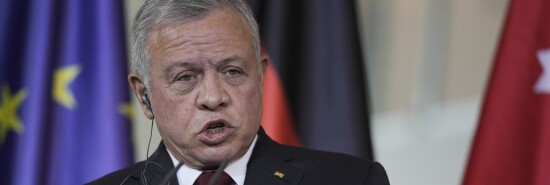
Israel war: Why Jordan cannot be ignored
Tom Rogan
Video Embed
Without King Abdullah II’s monarchy, the general stability and peace of the Middle East, including the peace of Israel, would likely not exist. Without Jordan’s General Intelligence Directorate, many American soldiers and civilians in the Middle East would be dead. Many civilians in Europe, including American tourists, would be dead. The GID is viewed by U.S. intelligence officers as the most reliable counterterrorism partner in the Middle East — more so even than Israel’s Mossad intelligence service. The GID’s infiltration of the Islamic State and al Qaeda and its cooperation with Israel have been of exceptional value.
This bears note as Jordan escalates its criticisms of Israel while that nation fights Hamas.
NOVEMBER TO REMEMBER: SIX THINGS TO WATCH ON ELECTION DAY
Recent days have seen Jordan’s prime minister warn that any Israeli displacement of Palestinians from Gaza or the West Bank would lead to “a declaration of war.” In numerous interviews, Queen Rania has suggested that the root cause of the conflict was not Hamas’s atrocity on Oct. 7 but rather Israel’s “occupation” of Palestinian territory and the destruction of Palestinian lives. Jordan has demanded an immediate ceasefire and a greatly increased provision of aid into Gaza.
Considering the scale of human suffering in Gaza, this aid corridor concern is legitimate on paper. It was positive, for example, that Israel allowed Jordan to conduct an aid airdrop into Gaza over the weekend. Nevertheless, Israel’s ability to expand humanitarian corridors is limited by its deep concern that doing so will allow Hamas to resupply. Humanitarian pauses would risk freeing Hamas units to rest and redeploy. A ceasefire would provide Hamas with an unprecedented strategic victory, one that catastrophically extinguishes Israel’s deterrent credibility.
Recent comments by Rania and her husband’s ministers also belie the ultimate cause of this conflict: Hamas’s desire, physically manifested on Oct. 7, to purge Israeli Jews from the entirety of Israel. Or what Rep. Rashida Tlaib (D-MI) might describe as the area “from the river to the sea.”
This genocidal intent, the repeated unwillingness of Palestinian leaders to accept realistic and conciliatory peace accords — most notably, in 2000 and 2008, and the Palestinian Authority’s corrupt incompetence are the key drivers of the contemporary Israeli-Palestinian conflict. Prime Minister Benjamin Netanyahu’s decision to empower extremist ministers such as Bezalel Smotrich is only a recent complication to the peace process.
Yet even as it holds to these understandings, the United States has a deep strategic interest in allowing Jordan to air its views and be heard. So also does Israel, something that Netanyahu’s predecessor, Yair Lapid, recognized in relation to Jordanian concerns over Jerusalem. The top line is that Jordanians are deeply opposed to Israel’s conduct in its war against Hamas. Even a cursory examination shows that Jordanian media outlets are utterly fixated on the civilian suffering in Gaza. This is the reality. And as an autocratic-populist leader, Abdullah’s stability requires his public recognition of his population’s viewpoints. The displacement of Abdullah’s rule would be far more problematic to Israeli and U.S. security interests than his present words.
In short, the U.S. and Israel needn’t agree with what Jordan is saying about the conflict or accept Abdullah’s demands. But they have every interest in suggesting to Jordan that they are listening.
